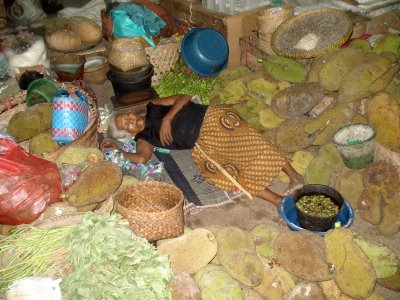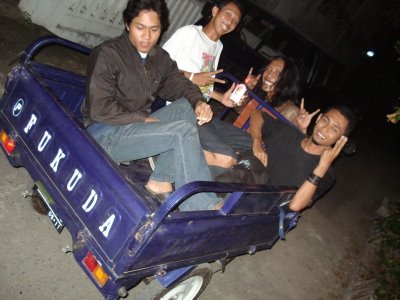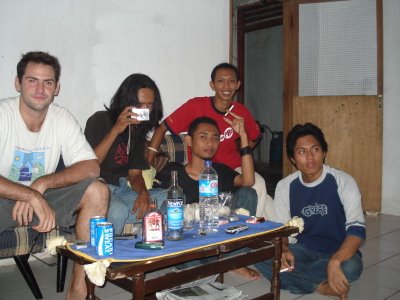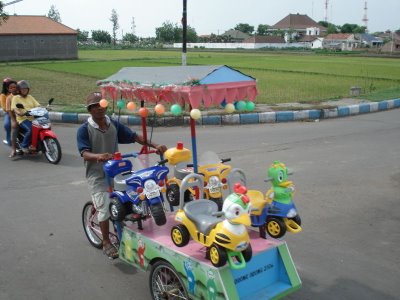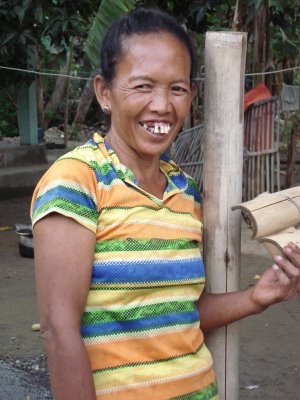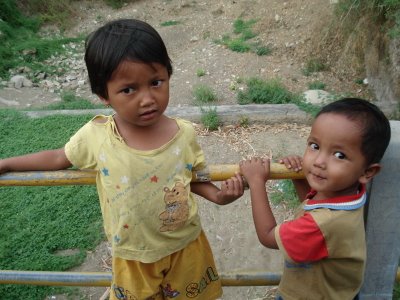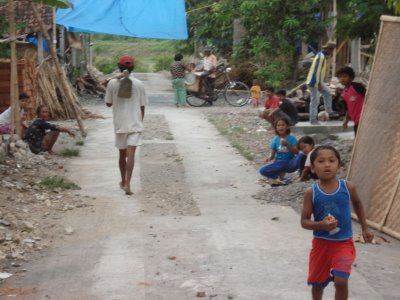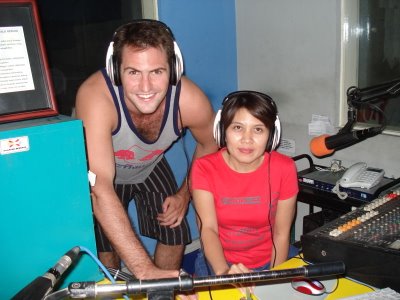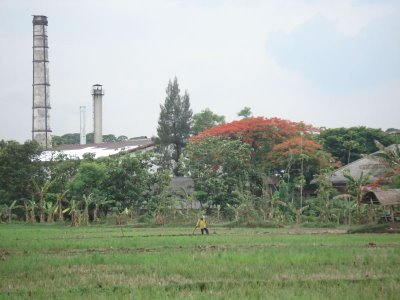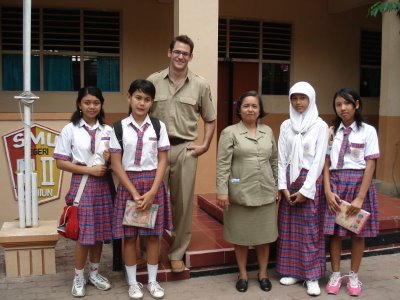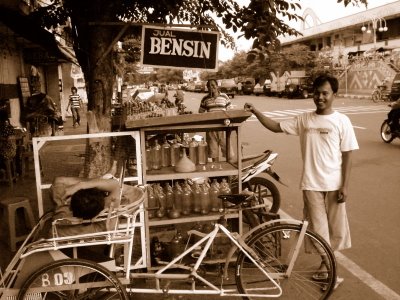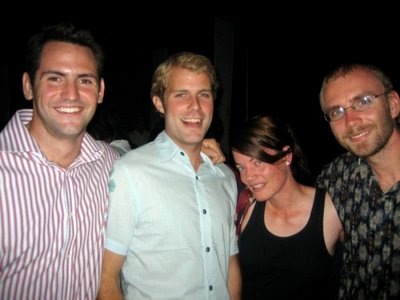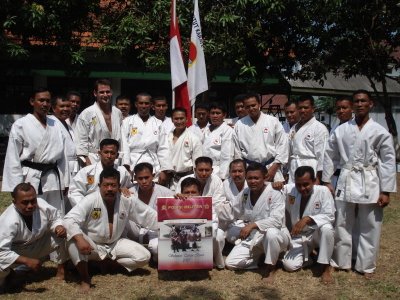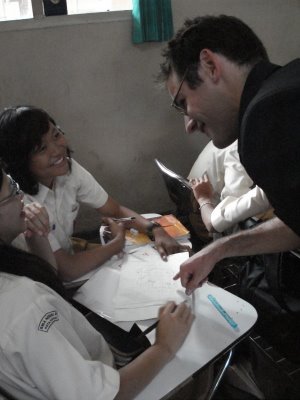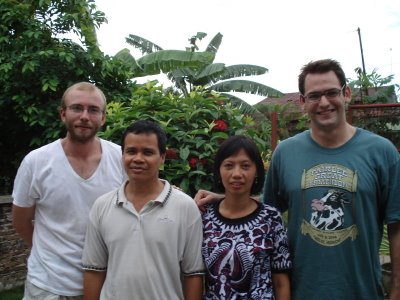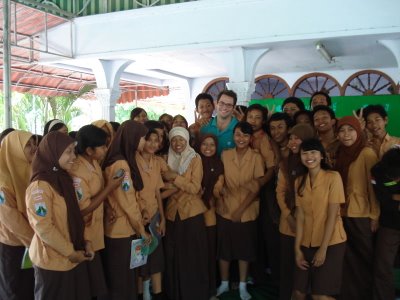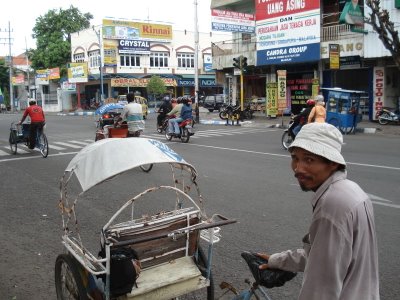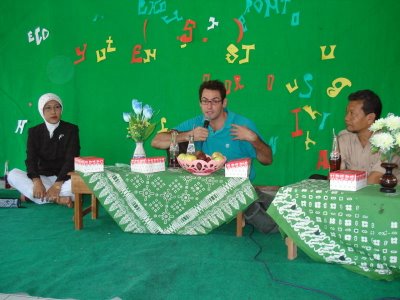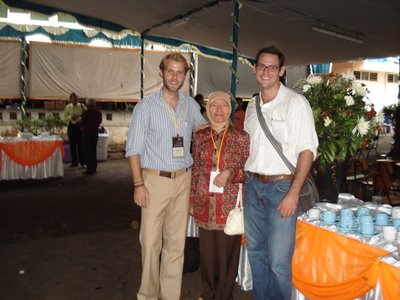A few months ago, I received word via the equivalent of telegram from the Fulbright Jakarta office that my presence would be required in the Central Java city of Salatiga for an English teacher’s conference during the first week of December. Instead of paying for a bus ticket to Salatiga, which is a relatively short five hour ride from Madiun, Fulbright mandated that I travel to Surabaya (three hours by bus), fly from Surabaya to Jakarta (one and a half hours), fly from Jakarta to Semarang (forty five minutes), and then take another hour bus ride to Salatiga. As ludicrous as the rigmarole seemed, it made perfect sense considering the bureaucratic hocus pocus that takes place at the Jakarta office. In any case, my convoluted itinerary at least gave me the opportunity to spend my weekend in Surabaya, Indonesia’s second largest city and home to my good friend Deanna.
I opted to take the train to Surabaya, and was treated to another picturesque journey through rice paddies, rubber forests, and infinite cassava fields. After arriving at the main station, I took a short taxi ride to the address that Deanna had given me. As the cabbie became progressively more lost, I marveled at the neighborhood that we were cruising around. Tall cement and cast iron gates enclosed fleeting views of verdant courtyards, parked Mercedes, and imposing Corinthian columns. The omnipresent bakso and sate vendors invariably still had shops set-up on every other block, but the streets were clean, even by Western standards. Deanna apparently lived in the posh part of town.
After multiple three point turns and repeated sorties into buildings to ask directions, the cabbie ultimately dropped me off in front of the correct address. I gave him the fare that we had agreed upon, but he stood waiting, staring beseechingly into my eyes, motioning with his hand towards his mouth. “Pak, come on bro, you charged me twice the normal fare to go ten minutes, when you said it would take thirty.” With a laugh, a friendly pat on the shoulder, and a drawn out “YAAAA,” he got back into his cab and drove away, leaving me in front of an impenetrable cast iron gate made of interlinked turtles. A security guard dressed in fatigues and an oversized pair of sunglasses materialized out of the ether and rang the doorbell. I heard a clatter and assorted commotions erupt from inside the house. While waiting awkwardly, I asked the guard if his sunglasses were from Deanna. “Bukan,” No, he responded. Well, so much for small talk.
I peered through the gate to see Deanna scampering towards me in front of an ancient ibu, hunchbacked, shriveled, and in full traditional (albeit faded) batik regalia. I heard the ibu going through the motions of releasing several padlocks, and when the large bronze door swung open, I was greeted by the toothless smile of a grandmother’s delight. After greetings and hugs, Deanna showed me into what can only be called The Compound. A life-size bronze tortoise protruded from one wall. A ten foot tall painted giraffe stood grazing amidst orchids and ferns. The house had high ceilings and marble floors, and armies of women shuffling about inside carrying various savory dishes to and fro. They all stopped to stare and giggle and receive a quick introduction from Deanna, who referred to all of them as “Bu.”
In the middle of the house was an inset courtyard, about thirty feet across, with a lushly vegetated (live) turtle sanctuary taking up most of the space. The interior of the house was classic Indonesian hippie kitsch, clean and neat but antiquated. Brown drinking glasses, Technicolor window shades, white artificial wood chairs, orange plastic cabinets – the things that I associate with photographs from my father’s childhood growing up in 1960s-era Brazil.
“Oh, yes, I see you are the good clean virgin.” I turned around to see a matronly ibu in her mid-70s striding purposefully towards me. “Excuse me?”
“Oh, yeah, Nick, this is Ibu Lika, this is her house,” Deanna explained.
“Oh, hello, bu, it’s nice to…”
“Yes yes yes, you are very handsome, and lucky you are tall or you would be very fat.”
“Ummmmm.”
“You are from New York, yes? I was there for a week before my husband died. He had to go to a conference in Las Vegas, and he left me in New York for a week. It was very lonely. People in New York are not like people here. They do not say hello and look at you in the face. Everybody is very serious. I did not like New York.”
“Ummmmmm.”
“Yes, I will call you jembut, it is a good nickname for you. You must always come stay here when you come to Madiun. I invite all the Fulbright people to come stay with me. You foreigners must have a home here in Indonesia, I know it can be very lonely. You must come here like a second home, yes? I know Madiun is very small, you need to come to a big city like Surabaya. You really should live here. Madiun is no place for a young man like you. All the beautiful girls leave and come to Surabaya. You must come live with me here in Madiun. Okay, now you will eat lunch. I will take a nap now, but tomorrow you will come to my son’s house, and we will go to the swimming pool. And I will find you a nice girlfriend here, yes. I have three girls for you. One is very pretty and good, the other is very smart and not so pretty, and the other is very naughty. But, yes, you do not know how to find the itil, I can see this. But it will be okay, you are very handsome and tall. Yes, this is your new home here. Madiun is no place for a young man, you must be come here. Okay, yes.”
With that, Ibu Lika waddled off into the kitchen leaving me feeling as if I had just been through a tsunami. “Are you serious? You deal with that everyday?”
“Yeah,” panted Deanna, “she’s a serious character. Her husband was a very successful orthopedic surgeon, but he died like twenty years ago.”
“Huh, and what does jembut mean? Why is that my nickname?”
“It means pubic hair.”
“Naturally, and what about itil? What does she mean “I can’t find the itil?”
“It means clitoris?”
“WHAT? What an extreme old lady.”
“Yeah, the computer guy came the other day and was talking with me about her. He said he was helping her with organizing her files, and like half the stuff on her hard drive is porn.”
“That actually doesn’t surprise me.”
While living in Madiun has undoubtedly served as an excellent introduction to the developing Muslim world, I have realized that extrapolating about the “Indonesian” or “Muslim experience” based on my perceptions there is a risky proposition. My wealth inherently separates me from the grand life choices – or lack thereof – that really make life in a developing country so different from life in America or western Europe. The life of an affluent expat, or any affluent person, living amidst relative poverty is by definition far removed from that of the mechanics, street vendors, janitors, post office employees, and even the teachers who make up the vast majority of the work force and population of a developing city and country. Ibu Lika lives in a similarly removed world of upper-class craziness, one that exists only for those who can afford the affluence of outlandishness. I reckon Ibu Lika and I are more similar than an initial reading would lend you to believe.
Deanna and I spent the night at Surabaya’s trendiest club, Blowfish. Located on the seventh floor of a downtown office building, by the time we arrived at midnight, the place was packed with fashionable, young, and beautiful Indonesians. DJs spun the latest international house beats while scantily clad women danced lasciviously on top of the bars. We could have been anywhere in the world, maybe with the exception of Madiun.
We were joined by two of Deanna’s friends, Ivan and Mimit, hip hop DJs at Surabaya’s most popular youth radio station. Mimit, who according to Deanna always wears the jilbab, was out for the evening with a floppy-eared ski hat on instead. It was a very interesting take on combining modern pop culture with a reverence for Muslim precepts, although I imagine she must have been sweltering.
After waking up late the next day, Ibu Lika wrangled Deanna and me into visiting her son’s house. Wawan’s place was even bigger than his mom’s. As stipulated by Javanese custom, Ibu Lika had bought Wawan his house for him after his wedding some fifteen years ago. Since then, his assorted business enterprises around the city have, apparently, done very well. He bought the two adjoining houses, and just a few days ago finished renovating the complex into a square-block sized compound complete with a basketball court, grilling station, pool and hot tub, Mediterranean and Classic Asian themed wings, a fish pond, and a state of the art media center.
When Deanna, Ibu Lika, her entourage, and I arrived, Wawan was welcoming two dozen other guests for a house warming cum “multi level marketing” session. While Deanna and I swam, watched high-definition rugby on ESPN, and gorged ourselves on freshly barbequed chicken sate, Wawan mediated the monthly Surabaya chapter Amway meeting. As the sun began to set, the meeting took a pause for the call to prayer. Women donned their full-body and head covering white prayer uniforms, and the men wore the peci, the Muslim prayer cap. One of the men from the meeting chanted the prayers from a spare bedroom above the basketball court. The full moon was rising over the rooftops, steadily creeping its way through the tangled mesh of barbed wire and satellite dishes. The prayers wafted through the sultry evening air as smoke from the barbecue drifted up towards gathering thunderheads.
That evening, I was treated to one of the most surreal experiences of my life. The day before, Deanna told me that we were invited to witness the filming of an Indonesian TV show, Lagu Rindu. That was all Deanna could tell me. Not relishing the idea of being part of a jilbab-clad studio audience, an only slightly more enthusiastic Deanna had to drag me to the affair. After changing into the red and black formal attire demanded by the teacher who had invited us (which meant jeans and a black t-shirt on my part), Deanna and I set off for the TVRI studios in Surabaya. TVRI is one of the national television stations, and is broadcast throughout the country. Daytime shows consist mostly of teary-eyed soap operas and B-side comedies. I had never seen a nighttime broadcast before.
Gorged on chicken sate and high quality home entertainment, we showed up at the studios at a quarter past nine, fifteen minutes late, but still perfectly within acceptable jam karet standards.
“OKAY OKAY OKAY, you are Ibu Ika’s bule yes? Let’s go, you are late,” a frenetic little man dressed in all black with a domineering headset around his neck met us at the studio entrance, and proceeded to usher us through a maze of hallways to a set of large swinging doors. Inside, about one hundred impeccably dressed middle-aged Indonesians sat gathered around tables set with white linen and crystal classes, nervously fumbling with their ties and purses. An eight piece band was on stage, dressed in matching aquamarine blazers and slacks. Six studio video cameras lay interspersed around the perimeter of the warehouse-sized room. And large, hot lamps hung from metal girders on the roof illuminating the spectacle as more small men dressed in black scurried between tables making last minute adjustments. As we entered the room, all eyes turned to us, not just with the normal “Oh, bules” sort of look, but with a more menacing “Oh, tardy inappropriately dressed bules” stare of disappointment and regret.
We were ushered to Ibu Ika’s table, directly within the sights of cameras Satu and Tiga. Ibu Ika, a woman in her mid-fifties who is a fellow English teacher at Deanna’s school, was seated at one of the twenty or so tables along with six other middle-aged women. All were dressed in very bright, very red outfits, ranging from full-body pantsuits to red leatherette jackets. Ibu Ika, a devout Muslim according to Deanna, had left her jilbab at home in favor of a black, bowler style hat. The others’ heads were uncovered.
“Oh, we were so nervous you wouldn’t show up!” Ibu Ika exclaimed in Bahasa Indonesia. “Blessed be Allah.” Brief introductions to the other Ibus were made, and a hush fell over the room as the countdown to broadcast began.
“Deanna!” I bent over and whispered “What the hell is going on? You told me we were going to be a studio audience. We’re not a studio audience, we’re center stage.”
“Just keep cool.”
An attractive girl in her mid-twenties with heavy make-up and an even more heavily sequined dress stood amidst the tables and began talking in rapid Indonesian. I was able to catch about a third of what she said, which consisted of “Welcome to the show” and “We have a special guest tonight, a former naval commander.” On a large flat screen TV located next to the band, I could catch glimpses of my large goofy head being broadcast to the other 15,000 islands in the archipelago. The band broke into a late-80s era piano-heavy jam, and a buxom woman from the audience rose to her feet and began singing Celine Dion.
“Deanna, are you serious? What is this?”
“I told you, I have no idea.”
Our table of crimson, scarlet, and cherry colored Ibus bounded up from their seats and began ballroom dancing with one another between and around the tables. Other couples did the same.
After the first tune ended, one of the larger and more intimidating Ibus returned to the table and demanded that I dance with her.
“Oh my god,” I pleaded with Deanna.
“Don’t be a baby.”
A new buxom and heavily made-up woman rose out of the crowd and busted into an Indonesian love song, eliciting loud cheers of approval from the audience. As I trampled the woman’s toes, I couldn’t help but notice that the large hi-definition screen intermittently flashed from images of the band, to solo close-ups of the singing Bu, to images of me bungling my way about the dance floor. I was led back to the table after the song had ended, and the Ibu thanked Deanna for letting “her borrow me.” Nary a word or look was passed my direction.
I sat sweating and staring slack jawed at my surroundings. Who watches this crap? I thought to myself. I never found out the answer to that question, and I never saw even so much as another hint or allusion to Lagu Rindu. Yet, after the hour-long program was over, I approached the young hostess. “You really should have danced crazier, like you did at the end,” she said in Bahasa Indonesia, referring to my reverse butt-shake boogie-down maneuver, executed in honor of my Aunt Rose, amidst thirty middle-aged Bus who were performing a choreographed line dancing piece. “When people dance like you,” the hostess continued, “we get higher ratings.”
